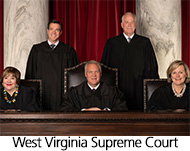11/19/2020
West Virginia Supreme Court Rejects Anything Goes Traffic StopsSupreme Court in West Virginia rejects out-of-jurisdiction DUI traffic stop as unreasonable.

The US Supreme Court's 2014 decision in Heien gave traffic police a free hand at stopping motorists who have broken no law so long as the officer made a "reasonable" mistake about the law (view case). The West Virginia Supreme Court last week dialed back the license given to the state's officers by refusing to reward "sloppy study of the law" that leads to such mistakes.
The high court had taken up the case of a man arrested for driving under the influence (DUI) on June 12, 2014, just outside of the Shinnston city limits. Despite not being in his jurisdiction, Shinnston Police Officer J. S. Billie stopped Jerry W. Stire after seeing the man allegedly stagger away from a car into a 7-Eleven store -- the officer never actually saw Stire driving. Stire failed the field sobriety tests and refused any breath testing.
Criminal charges against Stire were dropped, but the Department of Motor Vehicles (DMV) suspended his license on July 1, 2014. It took nearly five years for a circuit court to consider and ultimately overturn the DMV's decision. The lower court found the officer could not have performed a citizen's arrest since he never saw Stire driving, nor was he acting in his official capacity since he was outside of his jurisdiction.
Prosecutors insisted that the officer had made a "reasonable mistake of law" consistent with Heien in assuming he could perform a DUI arrest anywhere in the state. The high court was unanimous in rejecting this argument.
"Officer Billie cannot, at once, both cloak himself with 'color of office' to avoid the requirement of having observed the breach of peace, yet purport to act merely as a private citizen to remedy his lack of jurisdiction," the justices ruled.
The court also noted that Officer Billie admitted in testimony that, despite the field sobriety test results, the officer did have reason to believe that it was unsafe for Stire to drive. The court refused to apply the Heien precedent to these circumstances.
"Here, Officer Billie's mistake of law goes to his very authority to make an arrest," the court concluded. "A mistake of law does not create jurisdiction where there is none... We therefore conclude, as did the circuit court, that even if Heien were applicable, Officer Billie's purported belief about his ability to execute statewide DUI arrests simply was not reasonable."
A copy of the ruling is available in a 250k PDF file at the source link below.


